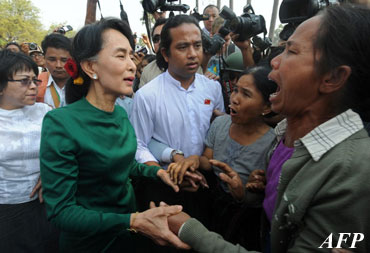It seems Aung San Suu Kyi is taking on what should have been the government's job. Her work on the Latpadaung Inquiry Commission was to find facts—not to make decisions for the government, because she does not lead the government. Thein Sein does.
 Suu Kyi can make recommendations as decided by the Commission but that does not mean the government is going to do everything the Commission recommends. That was not made clear to the villagers by Suu Kyi from the start of the Commission's work.
Suu Kyi can make recommendations as decided by the Commission but that does not mean the government is going to do everything the Commission recommends. That was not made clear to the villagers by Suu Kyi from the start of the Commission's work.
Presumably there is confusion in the villagers' minds about the approach Suu Kyi took in presenting the report. They look upon her as if she were the decision-maker. And of course she has assumed the role of talking and responding to the villagers as if she were the decision-maker. That, of course, lets Thein Sein off the hook.
Whatever it is she needs to take stock of to remedy the situation, the damage has already been done. Recovering her composure is going to be a big challenge; she has fallen off the pedestal that the general public built for her.
It may not be in her best interests to pursue the course she is taking. By asking the question, “Why do they want to keep this mountain?” she is making the most damaging statement of all, exposing the chasmal gulf between herself and the villagers.
She is clearly talking with her head not with her heart. Does she expect these aggrieved villagers to accept her explanation that by allowing the copper mine to proceed they are helping the national economy? Are rural people dispossessed from their lands expected to be empathetic to the role of foreign investors or the geopolitical importance of Myanmar’s relations with China?
Suu Kyi keeps repeating that she is not seeking popularity, but that does not ease the wrath of the villagers. After all, they have lost everything—the issue is NOT about her.
Suu Kyi claims she is looking out for the future of the country; but aren't the people the future of the country?
She may be addressing only 300 people, but in reality some 40 million villagers are listening to her all over the country.
Without our mountains and forests our beautiful country could turn into a desert like the Sahara, or a region like Isarn in northern Thailand which is the victim of slash and burn farming, a region that became so unfertile that poor villagers began to sell their daughters into prostitution.
If this issue cannot be resolved peacefully, then we should anticipate explosive situations all over the country involving farmers whose land has been confiscated. They are going to be very fearful. Some may be hysterical. Once panic sets in, things may spiral out of control. Then what?
All stakeholders need to look at the near future, not just from an economic angle but from a political perspective.
Myanmar cannot be allowed to lose what it has fought so hard to gain.
Myat Thu Pan is an interested observer of the political, socioeconomic and crucial issues happening in present-day Myanmar.



